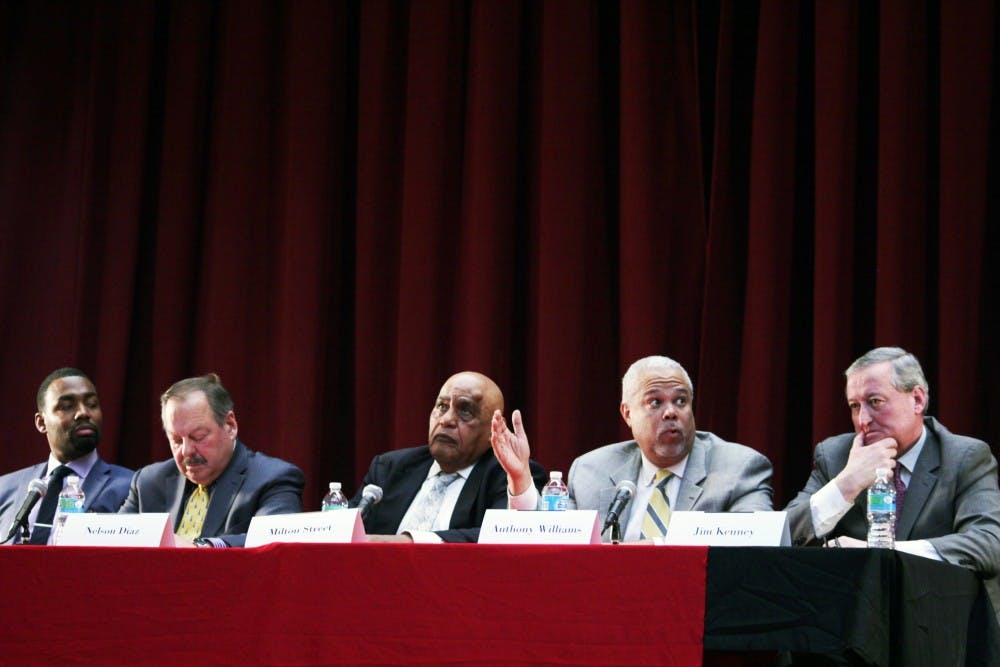
Philadelphians will head to the polls on May 19 for the Democratic primary elections for City Council and Mayor. In a city whose politics notoriously bleed blue, the Democratic primary is virtually the general election. Here are the key issues relevant to Penn students in the lead-up to the polls.
1. EDUCATION: Education has dominated the campaign for City Council and Mayor, though ideas for reform are far from reaching a consensus. Some mayoral candidates, like Doug Oliver, Nelson Diaz and Jim Kenney, have all openly supported PILOTs, or payments in lieu of taxes, which would come from nonprofits in the city to support Philadelphia’s debt-ridden public school district.
Some prominent candidates for City Council, including Penn alumnae Helen Gym and Sherrie Cohen, also have advocated for these payments.
Nonprofits like Penn are traditionally exempt from paying property taxes. While a resolution calling for PILOT payments did pass the City Council last month, nonprofit administrators have not been supportive of the idea.
Other ideas for education funding include property tax hikes, like the one proposed in Mayor Michael Nutter’s recently unveiled budget. All five Democratic candidates for mayor have vehemently opposed Nutter’s property tax increase.
Kenney and fellow candidate Anthony H. Williams have urged for the sale of municipal assets to assist the School District.
All candidates agree that propping up the School District is key to keeping millennials in Philadelphia, who could otherwise opt for better-funded schools in the suburbs.
2. LGBTQ REPRESENTATION: Despite receiving a perfect rating from the Human Rights Campaign’s municipal equality scorecard, Philadelphia has yet to elect an openly gay City Councilperson. With two high profile gay Democratic candidates, Sherrie Cohen and Paul Steinke, May’s primary election could be a turning point in LGBTQ representation in city government.
3. POLICE RELATIONS: Philadelphia has been no exception to the controversy over police-citizen relations sweeping across America. Penn students have been widely active in protesting police brutality and mismanaged law enforcement after the incidents in Ferguson and Staten Island. A Justice Department report released in March roundly criticized Philadelphia police officers for an irregularly high number of shootings.
According to the report, Philadelphia cops fired their weapons at a suspect 390 times over the past eight years. The report noted that blacks accounted for 80 percent of shooting victims, though white victims were more likely to be unarmed.
The mayoral candidates have mostly supported Police Commissioner Charles Ramsey, with the exception of candidate Milton Street. Doug Oliver has received plenty of criticism for his statement at a mayoral forum last week, where he said, “The sad truth is that the police have good reason to be afraid of black men.”
Oliver later clarified his comment at Tuesday’s debate. “It was not meant to be prescriptive. I would do anything to ensure that African American men are safe in their communities.”
Regardless of whether Ramsey keeps his leadership position, the City Council and new mayor will have work to do restoring citizens’ trust in the police.
4. MAKING STUDENTS’ VOICES HEARD: The Democratic primary will take place on May 19, the day after Penn's Commencement. Most students, even the few who would actually cast a ballot, will not be on campus.
Without representation at the polls, whether it be through absentee ballots or actual votes, Penn students will hardly see their views represented in city government. In the 2011 mayoral primary, only 980 votes were registered in Philadelphia’s 27th Ward, the area encompassing Penn’s campus and the nearby area. Penn students who do a bit of extra work to file an absentee ballot may reap the rewards of greater representation among city officials in the years to come.
The Daily Pennsylvanian is an independent, student-run newspaper. Please consider making a donation to support the coverage that shapes the University. Your generosity ensures a future of strong journalism at Penn.
DonatePlease note All comments are eligible for publication in The Daily Pennsylvanian.







